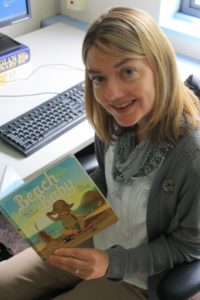Camosun Creative Writing professor Laurie Elmquist’s children’s book Beach Baby was recently published, and, much like the book’s protagonist, she learned a lot through the process.
As the title suggests, the book is about a baby who is coming to terms with the world around them by observing the things they see on a beach. Elmquist says that the key for her was realizing that board books are actually read by adults.
“I thought, ‘Who am I writing this for? Who is the audience?’ The audience is not the baby, the audience is reading the words, and so I just wrote it for an adult.”
Elmquist says that many of the animals in the illustrations in her book were inspired from her time spent travelling in California.
“I thought, ‘I’m so lucky to live in a time where we are still seeing all these animals from the shore in their natural state,’ and then my wish was that the next generation of babies would also have that privilege of seeing that. So that kind of pulled it all together with what I thought was a sophisticated enough idea.”

The opening line of Elmquist’s book is “Everything will be here when you wake.” Elmquist says that one reviewer of her book said it was good but backwards.
“The baby fell asleep right at the beginning,” says Elmquist with a laugh. “And I guess the normal progression is that, you know, you see all these things,” she says, pointing to the illustrations in the book, “and then the baby falls asleep. My idea was that you just imagine the baby falling asleep and the promise that all these things will be here when they wake up.”
Elmquist says she didn’t know there was a “wrong” way to do things in the eyes of the publisher, but it didn’t stop her. Quite the opposite, in fact.
“I really like that way of writing when you’re kind of stepping into new territory and you don’t even know you’re breaking the rules,” she says.
Elmquist has another book coming out in 2017 called Forest Baby. Orca, the publishing house releasing her work, came up with the name.
“Orca brings a lot to the table. I had called it something like Backpacking with Your Baby, and they said, ‘Let’s keep the theme going here.’ And we also did more editing on that one, because what I didn’t realize was that they sell into the States a lot.”
And that’s where Elmquist’s experience in California became the perfect selling point.
“This one worked because it had our local animals from the beach, but also the pelicans and the whales and things that I was seeing in California,” she says.
But when Elmquist took the book that is due to come out next year to her editor, she says they asked for “a bigger scope.”
“I thought it was hilarious how I was just doing that by accident,” she says. “And then I had to sort of re-jig some of those images so that they spoke to an American audience. So that’s the marketing side, and it’s really fascinating and I loved it.”
Elmquist says that her favourite part of writing children’s literature is the fun. It began when she saw her friends writing for seven- to nine-year-olds, which Elmquist also does. One of the tools she uses the most in her writing for children, she says, is humour.
“I’m so excited about it because I’ve kind of moved into this new audience, this new narrator,” she says, “because, you know, that age you can say so much to with humour and you can really tackle serious subjects.”
Elmquist says that the biggest challenge in writing for children as opposed to writing essays or short stories for adults—which she has also done—is having an ostensibly simple idea be more than it initially seems to be.
“I’m always thinking, ‘Okay, how can I take this complex dynamic and put it in a way that kids will understand?’ I know that kids are going through complex things just as much as adults, because we’re all living in the same world.”
Update: a previous version of this story said that Elmquist had told us “children’s books are actually written for adults.” She was actually referring to baby’s board books being read by adults. We apologize for the mistake.

